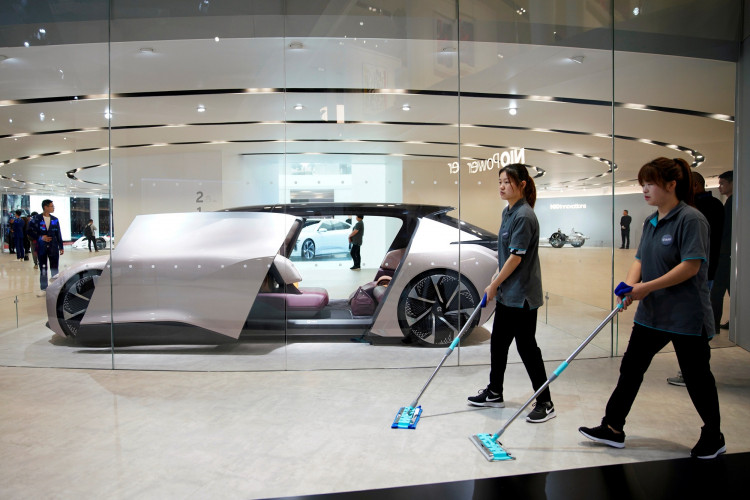Baidu Apollo Rolls Out Self-Driving Rides In Beijing
Following the launch of its Apollo Go Robotaxi service in Cangzhou and Changsha last month, Beijing-based technology company Baidu said Thursday it was launching 40 Robotaxi - self-driving taxis - in the capital, China Securities Journal reported.
Users in Beijing can book the service through the Baidu map app or its official website, Apollo, to experience the allegedly longest road network for a manned autonomous driving test in China. It is about 700 kilometers (435 miles) across Beijing, covering nearly 100 pickup and drop-off stations in districts of Yizhuang, Haidian and Shunyi. During the test vehicles will still have human drivers for safety but the ultimate goal is to provide a truly self-driving taxi ride.
Baidu Apollo received approval for self-driving tests in December after seven years of research and development. The company said its fleet completed 322,500 miles of internal testing before being ready to share the technology with the public.
Analysts estimate that the value of China's intelligent driving sector will reach 120 billion yuan ($17.6 billion) by the end of the year. Baidu Apollo's rival companies include WeRide, Pony AI and AutoX.
Nestlé To Focus On Farming In China
After selling off underperforming water brands to a domestic beer company last month Vevey-based Nestlé S.A., which owns 31 factories in mainland China, plans to penetrate deeper into the agriculture market there with spending of 400 million yuan ($58.5 million), The Paper reported.
Half of the new investment will go to Shuangcheng District in Harbin city, for improving production of infant formula, baby rice noodles and functional health foods aimed at boosting bone density and immune system response.
The company said it intended this as an upgrade which included developing a sustainable source of local milk, especially for its A2 milk products. A2 milk is marketed as a healthier choice.
The move brings the company's total incremental investment in Shuangcheng District in recent years to 700 million yuan.
Shuangcheng District in Harbin has been the company's main investment base. Nestlé built its first dairy base and dairy processing factory in China in 1990 and the company's large-scale cattle breeding center built in 2014 that produces dairy animals producing 42 kilograms of milk per day.
The company claims that some of the new investment will promote the development of local organic grain cultivation in Heilongjiang province.
Boeing Announces Additional Conversion Capability In Guangzhou
In the environment of China's increasing demand for cargo aircraft, the U.S. multinational corporation Boeing plans to set up a second freighter conversion line in Guangzhou, in joint collaboration with Guangzhou Aircraft Maintenance Engineering Company Limited (GAMECO), according to a joint announcement.
In June, GAMECO started operations of the first production line of its 737-800 Boeing Converted Freighter (BCF) project. The new production line, designed to reconfigure Boeing 737-800 passenger aircraft into the freight-bearing 737-800 BCF, is slated to be operational in 2021.
Boeing said the COVID-19 epidemic this year had further increased the demand for freighters carrying medical supplies and equipment while it had also encouraged airlines to shift more of their business to air cargo.
China is expected to account for 30% of worldwide demand for standard-body freighters in the next two decades, China Daily reported.
WHO OKs Shanghai Fosun Test Kit
Listed company Shanghai Fosun Pharmaceutical's COVID-19 nucleic acid test kit, with fluorescence real-time polymerase chain reaction (RT-PCR), was approved by the World Health Organization for its Emergency Use List, according to a company's statement.
The company earlier this week signed a strategic cooperation agreement with Sinopharm Group, a unit of China National Pharmaceutical Group, to supply a coronavirus vaccine candidate developed by German company BioNTech, Reuters reported.
The company claims its RT-PCR test kit is highly automated and stable and can assay 96 samples within two hours. It has been granted licenses by China's National Medical Products Administration, Australia's Therapeutic Goods Administration as well as the European Union. The test kits are expected to be exported to more than 10 nations including France, Germany and Belgium.
Shanghai Fosun Pharmaceutical (Group) Co. said net profit for the first half of 2020 rose 13% from a year earlier, thanks to increased sales of various anti-pandemic products and lower selling expenses, according to its 2020 interim report.





